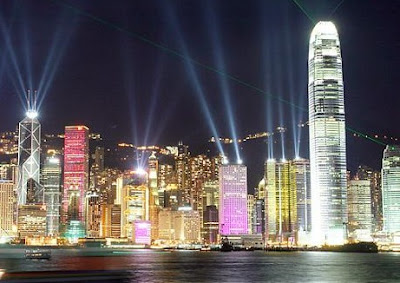LOS ANGELES – Gunfire shattered the window of the BMW near the University of Southern California campus just after midnight, striking two Chinese graduate students inside.
The driver was able to make it from the car, through the rain, to a house where he pounded on the door pleading for help.
Ying Wu and Ming Qu, who police say were believed to have been dating, were dead by the time they got to the hospital Wednesday morning as police spread out looking for a killer suspected of bungling a carjacking.
The slayings shook the campus, which has a large international student population, and laid bare a parent's worst nightmare: having their child harmed in a faraway place.
Hundreds gathered Wednesday night on campus for a candlelight vigil in memory of Wu and Qu.
"The hearts of the Trojan family are broken," said Dean of Religious Life Varun Soni who opened the ceremony.
Votive candles in the shape of a heart and white roses and lilies sat at the foot of the Tommy Trojan statue, the university's collegiate symbol, where grieving students dressed mainly in black and faculty gathered for the vigil.
Clay Dube, executive director of the USC-China Institute told the crowd that Wu and Qu were brave, serious and diligent and they had traveled a long way to study here.
"The families have invested so much in these children, so much love, so much hope, and the children know that. They know the expectation is they will come here and succeed," Dube said.
At USC, the international student presence is enormous -- it has the largest number of any university in the
U.S. Roughly 19 percent of the school's 38,000 students are from overseas, including 2,500 from China.
And some students said the shooting could be a cautionary tale for others who want to study overseas.
"If parents hear about this in China, it might affect their decision," said Chrissy Yao, a Chinese-American who moved to the
U.S. when she was 10 and is a senior engineering student. "Since two lives were lost, I think concerns will remain for quite a while."
Police said the shooting occurred around 1 a.m. and may have been a robbery or a carjacking attempt. Witnesses said the car was in the roadway, not at the curb, at the time of the shooting.
Later Wednesday, bouquets of roses, daisies, gladiolas and calla lilies sat next to a small table on the walkway of the home to which Qu ran for help. On the table was a remembrance book with a sign that read: "We will give this book to the parents of Ying Wu and Ming Qu. Write here in English or Chinese if you would like to share your thoughts with them."
Gloria Tigolo lives on the tree-lined street of two-story homes and apartment buildings and said she heard a gunshot. She said she went downstairs but didn't go outside because it was raining.
Investigators said earlier that several shots were fired at the couple.
Four people have been killed this year in the area, police said, but violent crime in the area is down 20 percent this year. Neighborhood watch signs are posted along the street and police were trying to determine if there are any surveillance cameras in the area.
Tigolo said she would often see Wu, 23, in the neighborhood, wearing dark sunglasses but rarely saw her drive.
Qu managed to get out of the car and run to a nearby home, where he pounded on the door, police Cmdr. Andrew Smith said. It wasn't known if anyone answered the door before the man collapsed. Qu would have celebrated his 24th birthday on Thursday.
The gunman fled on foot, and no description has been yet released by authorities.
Jiewen Zhu, a 24-year-old financial engineering graduate student from northern China, said she called her mother after hearing the news of the shooting.
"I just left a message to tell her I am fine, I'm OK -- I just don't want them to worry," she said. "This is really bad that it happened to us and our students, but I didn't feel so threatened."
Jessie Cai, 21, is an undergraduate student in electrical engineering and an international student from China who lives in the West Adams neighborhood. Cai said she is shaken over the shooting and is thinking of moving out of the area as a result.
"I do worry because we get a lot of crime alerts but we never actually catch the criminals," she said. She said she hasn't told her parents about the shooting yet, but she is sure "they will be freaking out" about it.
USC is in an urban center within a mile of gang-infested neighborhoods that have been plagued by high crime. The last time a USC student was killed was in September 2008 when Bryan Frost, 23, of Eagle, Idaho, was fatally stabbed by a former usher at USC football games.
Travion Ford was sentenced to 16 years to life after being convicted of second-degree murder. The two men were involved in an off-campus altercation.
Nearly 35 percent of the school's 7,226 international students are Chinese, according to the university's 2011 figures. In addition to China, 17.5 percent of USC's international students are from India, 10 percent from South Korea, 5.5 percent from Taiwan, 4.4 percent from Canada, 2.3 percent from Iran and just above 2 percent each from Hong Kong and Indonesia.
Just as Chinese students are the largest segment at USC, they comprise nearly one-fourth of the nearly 724,000 international students attending colleges and universities in the
U.S.
In recent years, they have helped fuel record international student enrollment on
U.S. campuses.
The types of students who come from abroad tend to skew wealthier because they often have less access to financial aid and must foot more of the bill themselves. With China's economic boom, more families can now afford to send their children overseas.
Both victims were graduate students studying electrical engineering. Their hometowns were not immediately released and messages left for the Chinese consulate were not immediately returned.
Yao, the senior engineering student, said she hopes that campus police could expand their patrol areas near the campus to provide better safety for students.
The West Adams district, where the shooting took place, has seen some revitalization.
Beatriz Moreno, who lives across the street with her family from where the shooting occurred, said the neighborhood has been cleaned up. She said the last shooting she could remember on her street was in 2003.
"We used to see this every day," she said. "There are mostly families here. This is not normal."















